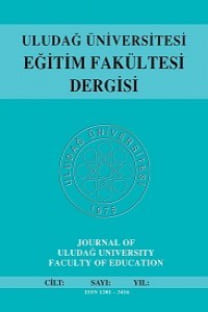Fransızca Dil öğrenicisi üzerine söylem incelemesi ve yorumlayıcıların yazılı anlatım becerilerine katkısı
Fransızca Dil öğrenicisi üzerine söylem incelemesi ve yorumlayıcıların yazılı anlatım becerilerine katkısı
We suggest in this study a semiopragmatic French teaching model for writing proficiency development. Speakers reflect self-images through their speech (ethos) to influence listener according to social rules (habitus) or logic (logos). We suggest a taskoriented model to acquire the discourse competence. We also handle Peirce's theory including social interpretant and speaker for French teaching. We can discuss the contribution of semiopragmatics with the task-oriented approach to mark learner behaviour faced with the writings. We intend to eliminate interpretative blockage to make learners capable of producing writings through interpretants. Peirce revealed a triad formed by object, representamen and interpretant indicating productive dynamics which can be developed with French teaching. French learners produce interpretations then they write their productions with an awareness of triadic sign relation. We believe that this process realises in three phases "semiotic awareness, interpretative production and writing proficiency" and we can integrate semiotic perspective with didactics.
___
- Amossy, R. (1999). Images de soi dans le discours. La construction de l'ethos, Paris, Delachaux Niestlé,
- Amossy, R. (2010). La présentation de soi. Ethos et identité verbale, Paris, PUF,
- Bourdieu, P. (2001). Langage et pouvoir symbolique, Paris, Points Essais, Cadre européen commun de référence pour les langues. Apprendre, Enseigner, Évaluer, 2001, Paris, Didier,
- Cuq, J.-P. (dir.). (2003). Dictionnaire de didactique du français. Langue étrangère et seconde, Paris, Ascdifle-CLE International,
- Cuq, J.-P., & Gruca, I. (2003). Cours de didactique du français langue étrangère et seconde, Grenoble, PUG
- Reboul, A. (1984). La Rhétorique, Paris, PUF (Que sais-je ?).
- Maingueneau, D. (1987). Nouvelles tendances de l'analyse du discours, Paris, Hachette,
- Maingueneau, D. (2009). Les termes de l'analyse du discours, Paris, Points, Essais,
- Everaert-Desmedt, N. (1990). Le processus interprétatif. Introduction à la sémiotique de Ch.S. Peirce, Liège, Mardaga.
- Atkın, A. (2006). "Peirce's Theory of Signs", Stanford Encyclopedia of Philosophy.
- Saussure, F. (1998). Genel Dilbilim Dersleri, çev. Berke Vardar, Multilingual, pp.106-123.
- Short.T.L. (2007). Peirce's Theory of Signs, Cambridge.
- Flumian, C., Labascoule, J., Royer,C. (2005). Rond-point 2, Maison des langues.
- Başlangıç: 1986
- Yayıncı: Bursa Uludağ Üniversitesi Eğitim Fakültesi
Sayıdaki Diğer Makaleler
İkinci Yabancı Dil Fransızca Öğretimi ve Salut! 10
Necmettin Kamil Sevil, Mehmet Bedirhan Öncül
Pre-service Science Teachers’ Self-efficacy Beliefs to Teach Socio-scientific Issues
Ebru Z. Muğaloğlu, Zerrin Doğança Küçük, Devrim Güven
Okul Öncesi Dönem Çocuklarının Bazı Oyun ve Oyuncaklarının Evrenselliği ve Güncelliğinin İncelenmesi
Pre-service Science Teachers' Self-efficacy Beliefs to Teach Socio-scientific Issues
Ebru Z MUĞALOĞLU, Zerrin DOĞANÇA KÜÇÜK, Devrim GÜVEN
